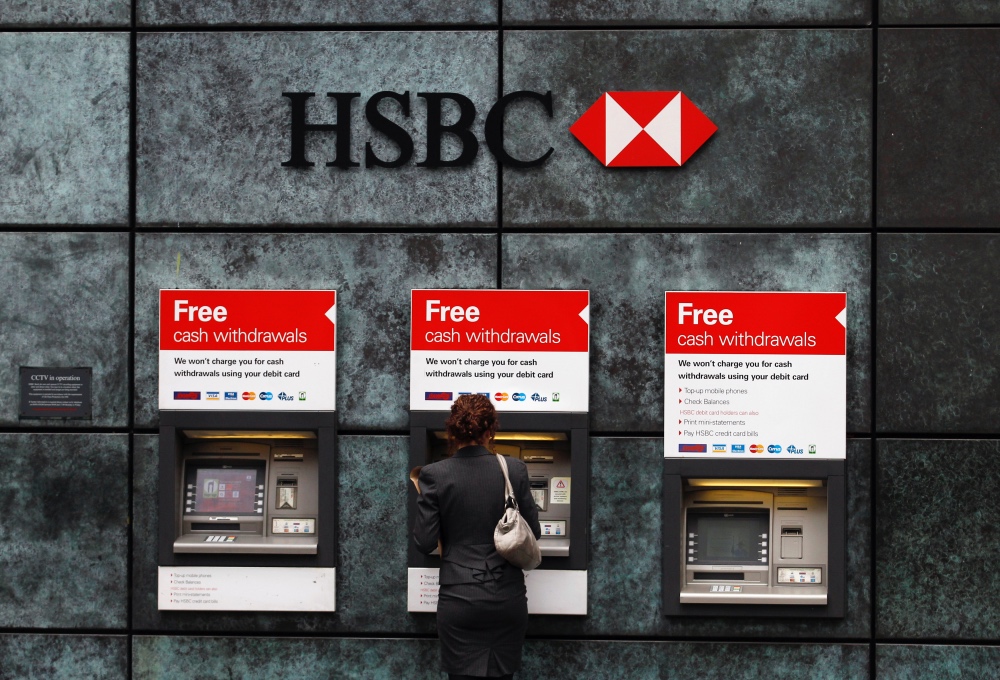London, UK
Thomson Reuters Foundation
Lucia, a sex trafficking survivor, flashed her new debit card and ran her finger along her name embossed on the plastic.
The 44-year-old Congolese nurse was trafficked to Britain last year, abandoned by her captors and is seeking asylum in the country, but she was locked out of the financial system.

A woman uses a cash point machine at a HSBC bank in the City of London on 28th February, 2011. P{ICTURE: Reuters/Andrew Winning
However Lucia is part of a British bank initiative to provide basic bank accounts to survivors of trafficking and slavery to give them financial independence, a scheme now being replicated by other banks globally.
“If I look at my card I am very happy, like my ID, I have my name there,” Lucia – whose name has been changed to protect her identity – told the Thomson Reuters Foundation in a busy cafe in an east London shopping centre.
Banks usually require official identification and proof of address to open accounts, which can be a hurdle for survivors who may not posses these documents.
Many will have had fraud committed in their name by their traffickers, which also prevents them from opening accounts.
Yet in an increasingly cashless society – where transport is often paid for using contactless cards and salary and benefits paid electronically – being financially excluded makes it even harder for survivors to rebuild their lives and find work.
In Britain, ATMs are closing and retailers switching to cashless payments, which could leave millions of people behind, authors of a review into the cashless society warned last month.
Builds self-esteem
Lucia, however, was able to open an account through an initiative by HSBC UK with support from the charity Migrant Help and now dreams of going back to work as a nurse again.
HSBC’s Survivor Bank – a basic account with debit card – is offered to people in the British government’s National Referral Mechanism, a scheme that identifies and supports victims of slavery and trafficking.
A total of 6,993 people were referred to British authorities as potential victims of trafficking in 2018, up from 5,142 in 2017 and 3,804 in 2016, according to National Crime Agency data.
Having opened her account about three months ago, Lucia is able to shop online and save.
She lives in shared accommodation in Peterborough in eastern England and volunteers and studies English in her spare time.
Lucia said waiting in limbo for a decision from the government about her asylum claim was stressful but having a bank account helped with her self esteem, as without ID she feels she is often treated “not like a person”.
Since trialing the service in June 2018 in the British cities of Glasgow and Nottingham, Survivor Bank has expanded to 32 HSBC branches across Britain, with 327 accounts opened.
“Until you haven’t got one, you wouldn’t necessarily realise how much you rely on having a bank account,” said Maxine Pritchard, head of financial inclusion and vulnerability at HSBC UK.
HSBC trained staff to open the accounts and works with charities whose case workers vouch for and support potential customers.
“[For survivors] even that step of walking into a bank can be very challenging…not knowing who you can trust, who is genuinely going to help you and that fear of being quizzed over documentation,” said Pritchard.
The initiative has caught the attention of banks in other parts of the world, with Canada’s Bank of Nova Scotia, or Scotiabank, piloting a similar scheme.
Bank of America, Citibank and Barclays are among 12 leading banks in Europe and North America also looking to replicate the idea, as part of a wider UN programme to harness the might of the global financial industry to battle human trafficking.
Launched in September last year, the scheme is part of an effort to tackle the issue, called the Liechtenstein Initiative, which also recommends tougher investigations, the freezing of criminal assets and expanded digital payrolls.
Practical support
Britain is home to at least 136,000 modern slaves, according to the Global Slavery Index by rights group Walk Free Foundation – a figure 10 times higher than a 2013 government estimate.
While legal support, housing and medical care are among the top priorities to help them rehabilitate, there are many basic but overlooked services and tools that can help them.
Smartphones with internet access and map apps can help victims find their way around unfamiliar areas.
Regular childcare, which can be hard to access when in temporary accommodation, can help them find work or study.
“Victims have been through so much, and then have so many barriers placed in front of them they have to try and navigate,” said Amelia Knott, a human rights consultant who set up a scheme to understand the transport needs of survivors.
Even having access to a washing machine or getting a haircut can go a long way, she said.
“Every little practical bit of help makes quite a substantial difference to individuals. If you take one small barrier away from people, it just gives them a bit more oomph to do something else,” she said.
She said that while charities helping victims were aware of these needs, a lot of their time was spent “firefighting” dealing with issues such as people being made homeless.
Kate Roberts, UK and Europe Manager for the charity Anti-Slavery International, said this highlighted the need for the private sector to play a greater role in helping survivors.
“We need more practical initiatives which work to fill the many gaps in recovery from slavery and government policy needs to support these, by allowing survivors of slavery to access to employment and a time of security and certainty,” she said.





